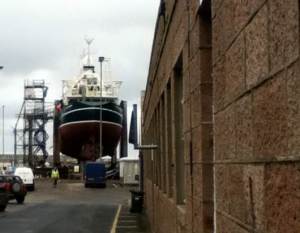It’s been a busy few weeks for some of the Environmental Governance members involved in research on sub-seabed carbon dioxide storage, with a hearing at the European Parliament and the publication of a paper looking at public and stakeholder perceptions of offshore CCS specifically. The key message is that it should not be assumed that moving energy infrastructure offshore completely removes the potential for public opposition.
Just to be clear, what is meant by ‘carbon dioxide storage’ in this context is the injection of carbon dioxide into geological formations deep underground for the purposes of climate change mitigation. This is part of the larger process of carbon dioxide capture and storage (CCS), which you can find more about here. The geological formations into which ‘captured’ CO2 can be injected may be either on- or offshore, however following public opposition to early attempts to store CO2 onshore, European countries at least are increasingly looking to offshore storage sites if/when CCS comes to fruition.
The social science work package of the EU FP7-funded ECO2 project (Sub-seabed CO2 Storage: Impact on Marine Ecosystems) has been investigating exactly these differences in perception between onshore and offshore storage, with School of GeoSciences people (Dr Simon Shackley, Dr Leslie Mabon, Nathan Bower-Bir) doing the UK work. ECO2 social scientists teamed up with project colleagues looking at economic, regulatory and policy aspects of offshore CCS to deliver a hearing at the European Parliament in Brussels on Tuesday 26 November. Dr Leslie Mabon gave evidence on the findings of public and stakeholder perceptions research in Scotland, raising three key points:
- public and stakeholder awareness of CCS is low and the wider social and political contexts are very dynamic, hence there is a need to continually track perceptions as offshore CCS develops;
- place history is vital – a history of energy infrastructure in coastal communities may engender support, but positive benefits may not always filter down to the local community (and even if they do, they may not be distributed evenly). There is also a risk of ‘development fatigue’ setting in;
- among some publics and stakeholders, there is a perception that existing governance arrangements are insufficient to deal with the huge timescales and large uncertainties associated with offshore CO2 storage. This may translate into a more cautious stance towards CCS as a whole.
The material presented at the hearing has just been published in paper form in Marine Policy, in an article that seeks to challenge the assumption among some developers and policy-makers that offshore CCS (and offshore energy more generally) is necessarily ‘easier’ from a social acceptance perspective. Many of the drivers of public and stakeholder perception do not correspond easily to land-sea boundaries.
The Marine Policy paper can be viewed here: http://www.sciencedirect.com/science/article/pii/S0308597X13002662 (if you are unable to access the paper, please contact one of the authors who will be happy to provide you with a copy of the manuscript)
Some more of Leslie’s thoughts on the European Parliament briefing – and on energy in marine and coastal areas – can be found here: https://energyvalues.wordpress.com/2013/12/04/energy-and-the-sea-a-busy-week/

